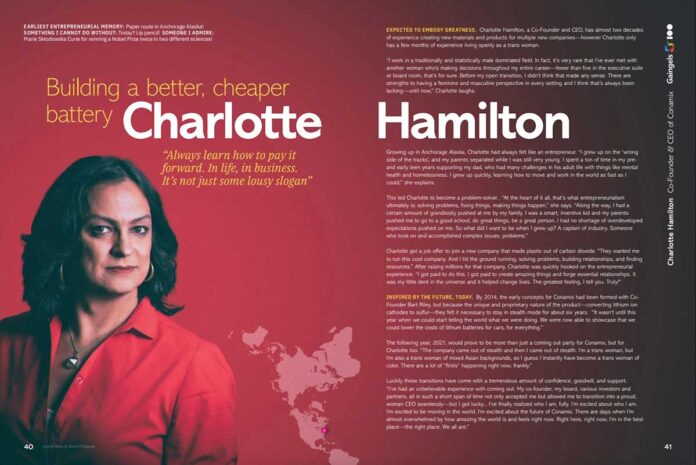
When Charlotte Hamilton was raising money and closing investments for her business, the lithium battery manufacturer Conamix, she faced several challenges, and not only from the business side. Just as the company was coming out publicly, Hamilton also came out, as a trans woman, one day before Trans Day of Visibility in 2021. She said she found key support from those who have been in her shoes before.
“I had really tremendous support from a couple of key business mentors who’ve crossed the bridges before publicly coming out as trans or gay,” Hamilton said. “Those folks were able to give me some really great advice on how to move as my authentic self and how to address the issues head-on with my board of directors and investors at Conamix.”
One organization assisting Hamilton is Gaingels, a private investment firm that prioritizes LGBTQ+ and other minority business-owners. One of the most active LGBTQ-centric venture investors worldwide, Gaingels is composed of over 2,000 accredited investors concerned with helping diverse businesses flourish. More than 1200 of Gaingels’ 2500-member investor network are part of the LGBTQ community, north of 33% are women, and over 25% are investors of color, said Lorenzo Thione, managing partner of Gaingels along with David Beatty and Paul Grossinger.

“Gaingels and Lorenzo specifically introduced me to dozens and dozens of investors and potential technical contacts across the major capital world,” Hamilton said. “They were pretty instrumental in helping me get to the point where I could close the investment last fall.”
Not only does the Gaingels team connect investors to minority-owned businesses that are in need of capital, they help business owners strengthen their companies by assisting with talent recruitment, board development, business development and DEI strategies.
Although originally founded on the model of investing only in LGBTQ-run startups, the Gaingels leadership team has since expanded to lend their services to any business with a minority founder or leader.
“We [thought] the problems that affected venture were never the exclusive purview of one underrepresented group,” Thione said. “[The issue wasn’t] that women were lacking or LGBT people were lacking in all the places where decisions were made. There was still a sorely lacking representation of visibility for underrepresented minorities of all kinds. All of that decision-making, visibility and wealth creation was flowing to effectively the same people that it had for a long time.”
In addition to Conamix, some of the companies that receive funds through Gaingels include MasterClass, a company that offers online classes to students of all levels; the clean energy company Palmetto; Cerebral, a company that provides online access to mental health prescription meds; and Jackpocket, which allows users to play state lottery games via phone.
Tia Lyles-Williams is founder and CEO of the Philly-based biotechnology and biopharmaceutical manufacturing company LucasPye BIO. She is the first Black queer woman to found and helm a biopharmaceutical manufacturing company of that scale. Lyles-Williams is in the process of drawing up an agreement to receive investment assistance from Gaingels, she said.
In terms of the significance of Gaingels, “we need a voice,” Lyles-Williams said. “The investment world, [venture capital] world is predominantly white, cis, male. It’s very hard when someone from the LGBTQ community or minority community comes in with this business idea that’s great, that makes sense, but they tend to have a hard time accepting that the person or the face is not their typical Harvard, Stanford, Princeton, white candidate.”
She added that she built LucasPye BIO to provide for diverse employees by offering benefits that include LGBTQ-specific healthcare, fertility benefits, providing adequate maternity and paternity leave, and other benefits. “Our goal is to normalize differences,” she said.
Both Hamilton and Lyles are featured in the first edition of the book Gaingels 100, a collection of stories of LGBTQ entrepreneurs from around the world. Thione hopes to make it a yearly publication.
“The Gaingels 100 is very much an example of how we think we can bring about more change by telling and elevating the stories of really amazing, diverse entrepreneurs within the LGBTQ community around the world,” Thione said. “It was really important for us to not just pick a bunch of white gay guys in the United States, but really go and look for all the facets and all the places around the world where people are building great businesses with venture backing in some of the most challenging circumstances.”
Before joining Gaingels, Thione co-founded the company Start Out, which serves to boost the quantity, diversity and influence of LGBTQ entrepreneurs. It also publishes the report The State of the LGBTQ+ Economy in tandem with The Global Entrepreneurship Network, the National LGBT Chamber of Commerce (NGLCC) and the small business navigation organization Hello Alice. The 2021 report indicates that the LGBTQ community accounts for a $1.7 trillion national economic impact in the U.S. The over 14,500 small business owners surveyed in the report are diverse in age, gender, race and industry.
There is a stark need for more capital for minority-owned businesses in the U.S., as evidenced by surveys on the economic needs of LGBTQ-run businesses. As such, legislative bills have been introduced in the U.S. House of Representatives.
“We’ve been working at the NGLCC and with our partners on pieces of legislation on the state and federal level that would level that playing field and finally add LGBTQ to the two most important things we need,” said Jonathan Lovitz, special advisor to the NGLCC and candidate for the Pa. House of Representatives. Those two needs are “getting capital directly in the hands of small business owners to help them go, and tracking the data on how that capital and economic returns are benefitting the country.”
One such bill is HR1443, LGBTQ Business Equal Credit Enforcement, which Rep. Ritchie Torres and Lovitz wrote. It requires financial institutions to report specific credit application data regarding lesbian, gay, bisexual, trans or queer-owned businesses to the Consumer Financial Protection Bureau to facilitate enforcement of fair lending laws. At the moment, the Credit Enforcement Investment Act tracks minority-owned businesses based only on gender and race.“We’re working on this legislation across the country to fill in those reporting gaps and ultimately get the public sector caught up to where the private sector has been for decades now,” Lovitz said.